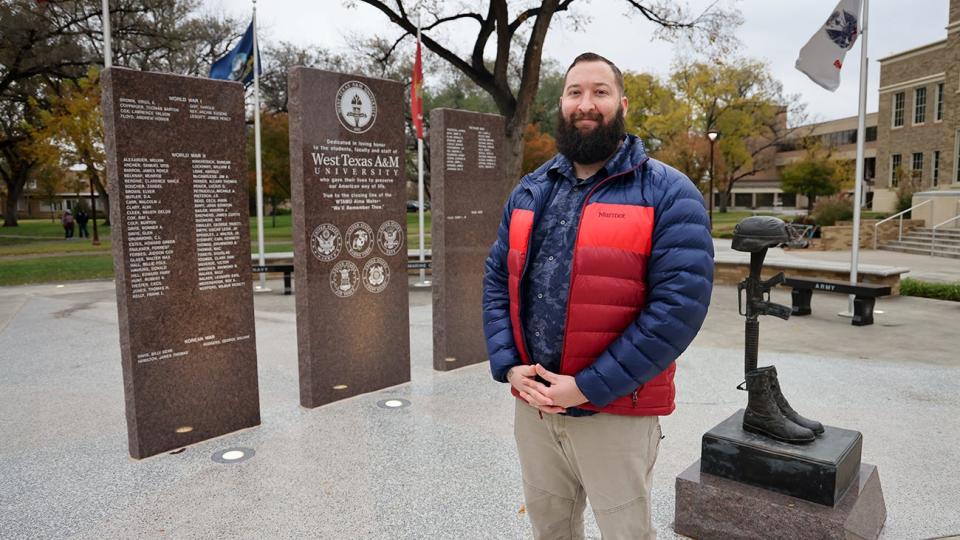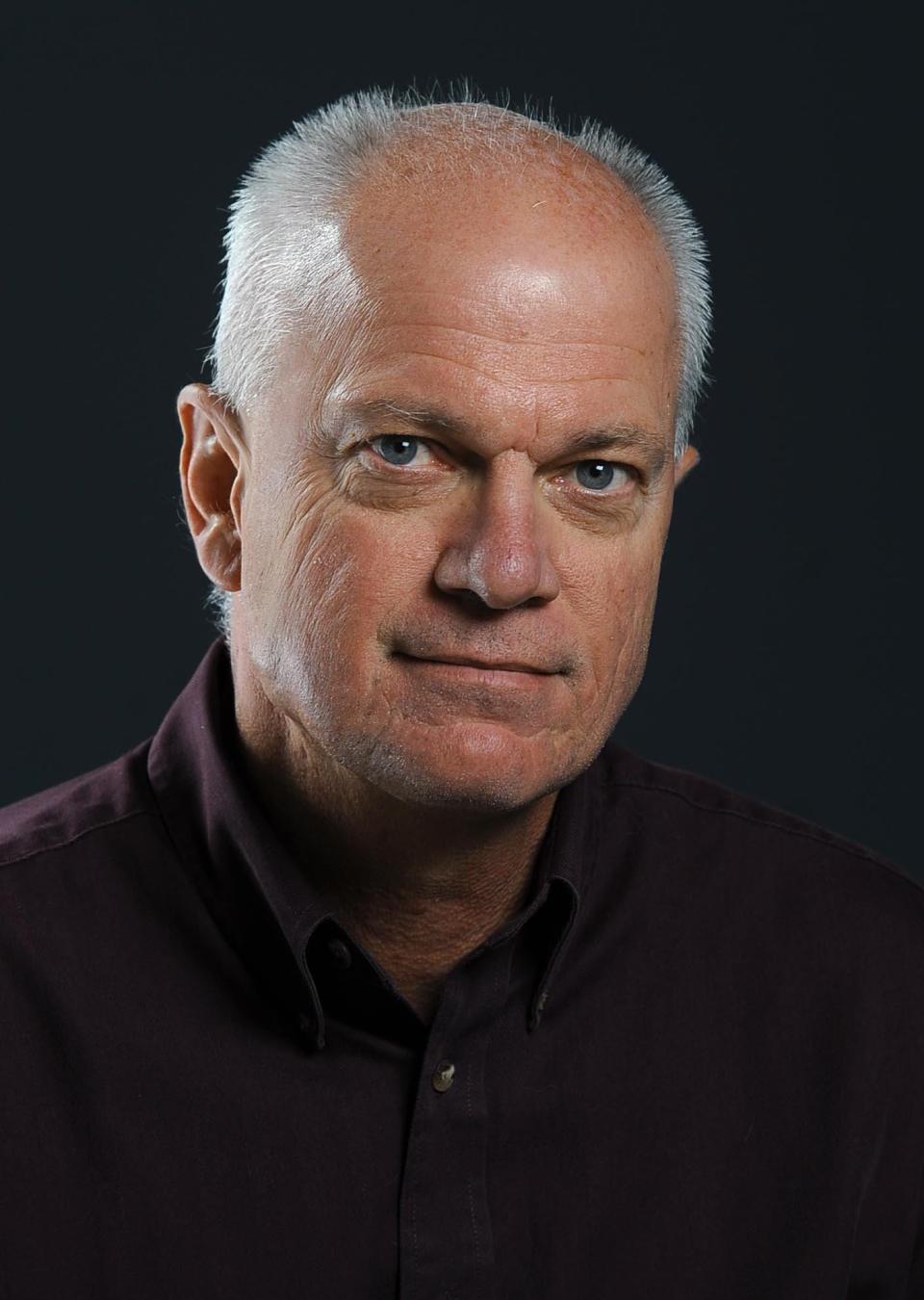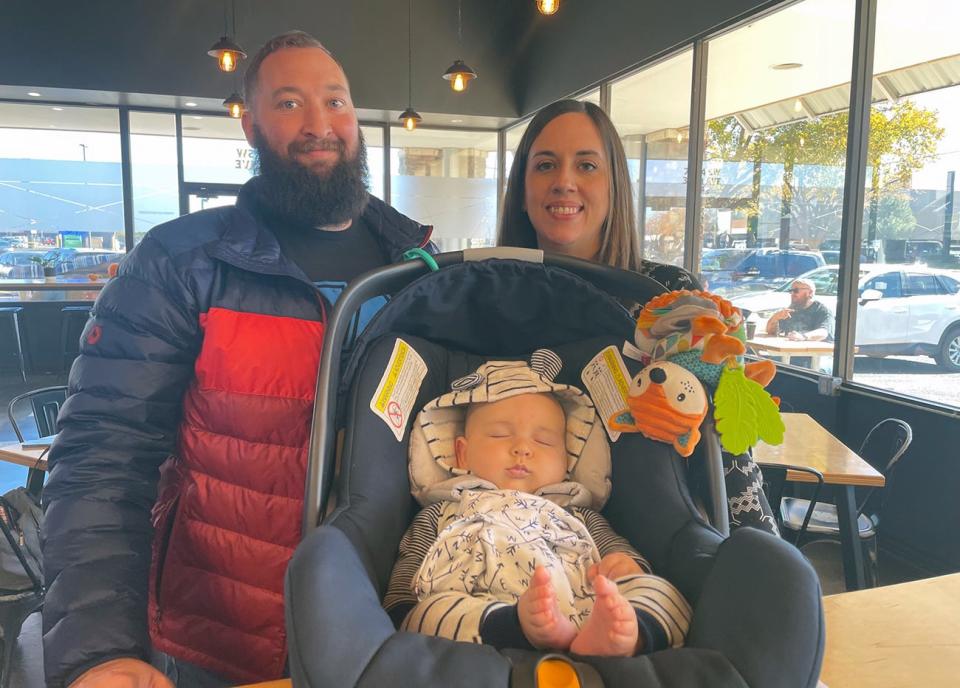Beilue: Finding a focus after military
Joshua Crawford has been at the intersection of where military life ends and civilian life begins. It’s one where many wrecks occur.
“They train you for years to be a precision tool in the military,” Crawford said, “and then they give you three weeks to say, ‘Go build a resume, get a job and figure it out.’ There is no transition.”
Only those who spent years in the military, especially those in combat, and then put that aside for a different, uncertain way of life know the roadblocks ahead. Sometimes the obstacles seem insurmountable. Veterans Day brings that into view.

Crawford, who spent time in 2010 through 2012 in combat in Iraq and Afghanistan, knows of many veterans who struggled to cope with life after the military. In many ways, their identity was gone. Many medicated themselves with drugs and alcohol. A few took their own lives.
Crawford, 33, felt much of that despair after he was medically retired from the Army in 2016. He had a brain injury, some effects of PTSD, and the anxiety and depression of supporting a family without much training.
There were no drugs, but some alcohol issues in the beginning. Crawford said he’s fortunate because of an extended family support system, and he realized veterans need a focus, a hook for their new life.
“You have to find something worth living for. For me, I have an amazing wife and children and a great family,” he said. “None of that is worth throwing my life away for.
“So once they find that thing, be persistent in taking care of yourself — your mental health and getting rid of things not benefiting you physically and emotionally, whether that’s toxic relationships or drug and alcohol abuse.”
Outside of his immediate family, which includes wife Amanda, four-month-old son Logan and three older daughters from a previous marriage, Crawford also found a future and a path to help others. West Texas A&M University is helping him get there.
Afghanistan: ‘Wild, Wild West’
In 2006, Crawford wasn’t sure what he wanted to do. He would graduate from Amarillo High School in six months. He thought about being a youth pastor. He thought about a lot of things.
While working at Chili’s, he waited on an Army recruiter, who pitched the Army to Crawford. At least take the Armed Services Vocational Aptitude Battery, he said, the standardized test for math, science and leadership. Though it is required to enlist, the test didn’t obligate Crawford.
Crawford’s family has five generations of military service. One of the first memories of his father Timothy was when the family was stationed in Germany and his father would come home in fatigues and camouflage paint.
Crawford took the test and scored 92 out of 100. He still thought he might want to go to college, but the recruiter reached out in April 2007. He had an offer of a four-year contract and a $30,000 bonus. Crawford accepted, wanting to go into the infantry like his father.
Two months after graduation from Amarillo High, Crawford was at Fort Benning, Georgia, for 17 weeks of One Station Unit Training in combat arms and infantry. He was training to be a mortar man, but he was injured in airborne school and did not graduate.
This was during the surge in Iraq in 2007, and Crawford was reassigned to Fort Lewis, Washington. For the next 1 ½ years, he trained with the Third Brigade of the Second Infantry Division, Striker Brigade Combat Team, Fifth Battalion, 20th Infantry Regiment.
In May 2009, Crawford was mostly in the Diyala Province in Iraq. There were some combat missions, but most were peacekeeping missions to win the hearts and minds of Iraqis—counter-insurgency assignments, rebuilding infrastructure, meeting with religious leaders, providing supplies.
“Iraq was kind of boring compared to Afghanistan, but it was the most impactful,” Crawford said. “Some of it was because I was younger and it was my first experience. I was involved in IED blasts where people were targeting us, but we never saw the enemy.”
Crawford spent a year in Iraq. After that, he completed airborne school, and then left for Fort Wainwright, Alaska. He later went to Afghanistan in 2010 where he spent a hard year.
“Afghanistan was more complicated,” he said. “It felt more like the Wild West compared to Iraq. In Iraq, we never saw the enemy. We just got blown up.”
Six days after leaving Alaska, Crawford was on his first mission in Afghanistan after arriving 12 hours earlier. Crawford was part of a traveling party from Kandahar to where they were staying. It was in the middle of the night. Welcome to Afghanistan.
“We got ambushed,” he said. “I was in the lead truck. An RPG (rocket-propelled grenade) hit the side of my truck. Then one hit the truck behind me. The whole hillside lit up with AK fire. There were bad guys just waiting, and I’d never seen that in Iraq.”

There were many things Crawford would see that he never had before, experiences he could not have imagined from that chance meeting with an Army recruiter four years before.
“That continued to happen,” he said. “This is where people’s experiences vary drastically in the military. I saw a lot more death, handling dead bodies a lot. It gave me a negative outlook on the world just to see that side of humanity. There was a lot of inhumane acts of war, though I guess most acts are inhumane.”
Crawford saw Afghani civilians and police blown up. Death was nearly daily. The seeds of PTSD were growing. He also had a traumatic brain injury from that first ambush that at the time was undiagnosed.
“Those medical diagnoses give you an outlook on the war that you see all the time because you’re dealing with these conditions sometimes the rest of your life,” Crawford said. “It’s sitting there in the back of your head. If you came out with no injuries, it might be easier to forget.”
In describing the year in Afghanistan, Crawford relayed what a Vietnam veteran told him not long ago as he was doing some counseling at the local Veterans Resource Center.
“I can relate to this,” Crawford said, “but he called it ‘the war machine.’ It just chews them up and spits them out. That’s kind of what it felt like. Every day you’re walking on egg shells maybe waiting for your time.”

Future needs a focus
After leaving Afghanistan in 2011, Crawford returned to Fort Benning. In July 2016, he was medically retired as staff sergeant. He came home to Amarillo.
“For the first four or five years, there was a lot to unpack,” Crawford said. “Only the last year and a half would I say I’ve got a lot better.”
VA counseling, the health and mental health system, relationships, divorces, figuring out the new you: Crawford said all of that is daunting.
“When you get out, your whole self-identity is gone,” he said. “You have these underlying medical conditions that need to be taken care of and most guys who served in combat units cope by drinking. Most are professional alcoholics.
“The VA is giving you all these medications. So alcoholics who are not adjusted are on these heavy medications, and it can become very dark. All of it can be overwhelming if you don’t have a good supporting cast and fortunately, I have one.”
Crawford knew for a promising future, to rediscover his identity, he needed further education. He enrolled at WT in August 2016, originally to study nursing. That didn’t seem to fit, so he switched to education, but that wasn’t the answer either.
He soon, however, found his way to social work and a new goal of being a licensed counselor to help veterans who are where he once was. Crawford took a break from classes from 2018 to spring 2020, somewhat because of COVID, and it almost proved costly.
Crawford, who had As in his classes, said he can only handle in-person classes. Those were halted in March 2020. He put school on hold, but had already enrolled for classes in that summer and fall semesters.
He didn’t realize he needed to withdraw, though, and failed those classes. Because of that, he initially was denied entry into the master’s program last spring. He wrote letters and met with professors to explain what occurred and why.
“I explained to them my passion was in helping vets,” he said, “and didn’t care what path I took, I was eventually going to be in this program and graduate.”
Crawford was finally accepted into the master’s program, crediting the help of Dr. Henry Poduthase, his adviser and associate professor of social work. Crawford earned a bachelor’s degree in applied arts and sciences in May with most of his work in psychology and social work. Many of his military credits transferred.
He is in the early portion of a two-year master’s program. After that his intent is to become a licensed clinical social worker.
“In the veteran treatment community, there are not a lot of practitioners who understand what veterans are going through because they are not veterans,” Crawford said. “There is a level of care and understanding I could give my clients that others might not be able to.”
Amanda and Joshua have been married for more than four years. She is studying nursing at WT. One day they could both be working at the Amarillo VA – Joshua as a counselor and Amanda as an oncology nurse.
“When we first met, he was working and put that on himself to provide for the family and he was very stressed trying to handle everything,” Amanda said. “When he had the opportunity to stop working and focus on school, he changed for the better. He’s just taking care of himself now compared to four years ago.”
Crawford is in a better place. He, Amanda and Logan live in a quiet cul-de-sac in Bushland. He’s sober. No nicotine. Exercising when possible. He eats healthy and stays current on his medical diagnoses. WT is helping to springboard to a career that should fulfill him.
“One day,” he said, “this will be a success story.”
It likely already is.
Editor's note: This column originally appeared on the WT website.
Do you know of a student, faculty member, project, an alumnus or any other story idea for “WT: The Heart and Soul of the Texas Panhandle?” If so, email Jon Mark Beilue at jbeilue@wtamu.edu .
This article originally appeared on Amarillo Globe-News: Beilue: Initially without direction, Crawford finds path through WT

